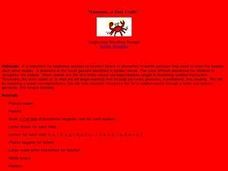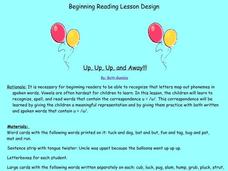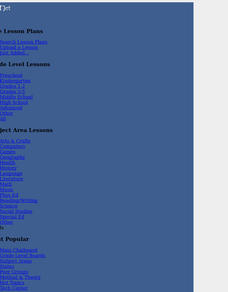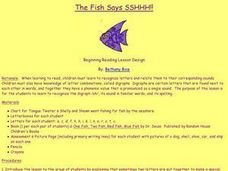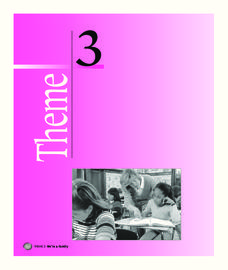Curated OER
Open Up and Say /o/
Pupils recognize the short vowel o in written and spoken language. Through matching and listening activities, they discriminate the vowel sound /o/ from other phonemes. Students identify the phoneme and letter in words and pictures.
Curated OER
U-u-under The U-u-umbrella!
Students practice using phonemes because they need to be able to recognize that phonemes and letters correspond with each other in order to become a proficient reader. The practice is done using the letter "u".
Curated OER
"Aaaaaaa...a Fast Crab! "
Students participate in an emergent literacy lesson that focuses on the skill of phonemic awareness. The phoneme chosen is the letter "a". They need to correlate the sound to the letter.
Curated OER
O-O-O-O-O, I get it!
Pupils engage in an emergent literacy instructional activity that focuses on the skill of phonemic awareness. To practice the skill the phoneme for the letter "o" is used. The students need to recognize the letter and its corresponding...
Curated OER
Yellowish Fish
Students engage in an emergent literacy lesson plan in order to obtain the skill of phoneme awareness to become better readers. They practice blending different phonemes in order to eventually form words.
Curated OER
Up, Up and Away
Students recognize the short vowel u in written and spoken language. Through matching and listening activities, they discriminate the vowel sound /u/ from other phonemes. Students identify the phoneme and letter in words and pictures.
Curated OER
It's Icky Sticky
Students recognize the short vowel a in written and spoken language. Through matching and listening activities, they discriminate the vowel sound /a/ from other phonemes. Students identify the phoneme and letter in pseudo words they decode.
Curated OER
Oh! Let's Go Home
Students distinguish between short vowel o and long vowel o. They are introduced to the vowel-consonant-e pattern that changes short vowel sounds into long vowel sounds. They practice reading and spelling words with the vowel-consonant-e...
Curated OER
Meet Lee, the Sleepy Bee
First graders distinguish between the different ways to create the sound for long vowel e. They are introduced to the vowel patterns that comprise long vowel sounds. They practice reading and spelling a variety of words containing the...
Curated OER
Hi, My Name is A
Students distinguish between short vowel a and long vowel a. They are introduced to the vowel-consonant-e pattern that changes short vowel sounds into long vowel sounds. They practice decoding pseudo words with the vowel-consonant-e...
Curated OER
Spelling Connections Grade 2: Rhyming Words
In this spelling learning exercise, learners analyze six pictures and the words printed above them with a circled letter. Students change the circled letter in the word to make a rhyming word that fits each picture. Learners then use a...
Teachers.net
Chicka-Chicka-Boom-Boom/ Chicka Challenge (Elementary, Literature)
Is your Kindergarten class about to read the book, Chicka-Chicka-Boom-Boom? If they are, and you want a few wonderful activity ideas to reinforce phonemic awareness and letter identification skills, look no further. Here you'll find over...
Curated OER
Chug-a-Chug-a Choo Choo
First graders identify the digraphs in written and spoken language. After a brief discussion on the combinations of letters that comprise digraphs, 1st graders practice identifying initial and final placement of the digraph /ch/ in words...
Curated OER
Icky Sticky
First graders the /i/ sound by practicing the way the mouth moves while making the sound while saying "icky, sticky." They write the letter "i" using both upper and lower case letters, make words using letterboxes, and write about a...
Curated OER
Allie The Alligator
Students recognize the short vowel a in written and spoken language. Through listening activities, they discriminate the vowel sound /a/ from other phonemes. Students associate the phoneme with its letter representation and identify them...
Curated OER
The Fish Says SSHHH!!
First graders identify the digraph /sh/ in written and spoken language. After a brief discussion the independent and combined sounds of the phonemes /s/ and /h/ students practice identifying initial and final placement of the new digraph...
Houghton Mifflin Harcourt
We’re a Family: English Language Development Lessons (Theme 3)
Teach your English language learners how to talk about their families with three weeks of lessons. Over the course of the thematic unit, learners pick up new vocabulary so that they can talk about families and relationships, clothing,...
Curated OER
Where is the Sound of H?
In this letter/sound worksheet, learners look at pictures, circle the letter sound they hear at the beginning of the word, then print the word in the space provided.
Curated OER
Word Sort ----at
In this rhyme activity, students see 16 full color cards and word labels for the rhyme pattern ---at. This is an independent center activity and there are directions for sorting, writing, and classifying.
Houghton Mifflin Harcourt
Let’s Count!: Extra Support Lessons (Theme 5)
In a themed series of lessons and activities, beginner readers are given extra support in reading through chants, games, and practice worksheets.
Curated OER
Phonics: Words with More Than One Syllable (CV/C) Rule A
Knowing basic phonics rules can help learners increase their reading accuracy, pronunciation, and spelling. Third graders practice breaking or chunking words based on the cv/c syllable rule. They take note of where to break each word,...
Curated OER
Ending consonants Worksheet: K, G, N, P
In this ending consonants worksheet, students study each of the pictures and write the correct ending consonant to complete the 4 words.
Houghton Mifflin Harcourt
A World of Animals: Extra Support Lessons (Theme 10)
Provide extra support with this collection of animal-themed lessons. Early readers gain proficiency in high frequency words are and he, practice blending short vowel sounds, and substitute initial and final phonemes while...
Houghton Mifflin Harcourt
A World of Animals: English Language Development Lessons (Theme 10)
Animals are the theme of this series of English language development lessons. Scholars take part in grand conversations about woodland, jungle, and grassland animals. They also go on picture walks, read poems and high...




